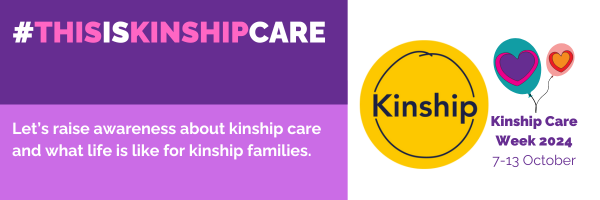Kinship Care Week: Recognising and Supporting a Vital Family Role

It’s Kinship Care Week 2024 this week (7–13 October) which is an opportunity to celebrate the incredible role that kinship carers play in children’s lives and society.
It’s essential to spotlight kinship carers—those who step up to raise children when their parents are unable to. While the importance of kinship care often goes under-recognised, these family members or close friends play a critical role in providing love, stability, and continuity in a child’s life. Kinship care helps children remain within their family networks, preserving cultural identity and emotional bonds that traditional foster care may disrupt.
One of our core team members here at Welfare Call Group is a kinship carer and they’ve been kind enough to share their experience and reflect on this journey:
“I have helped to care for my nephew since he was 3 years old. People know this as kinship care, but we have never put a label on it. We have done this out of pure love and instinct… Now he is 17, learning to drive, doing an apprenticeship, and has a job. His relationship with his parents remains positive and I’m proud of the young man he has turned out to be.”
This heartfelt reflection shows how kinship care often arises naturally, driven by love, rather than being part of a formalised process. These carers do it out of a deep sense of duty, not for recognition, which means their contributions often go unnoticed.
The Role of the Virtual School Head in Kinship Care
An important but less well-known aspect of kinship care is the recent extension of the Virtual School Head (VSH) role. Previously focused on children in the care system, the VSH role now supports children with a social worker and those in kinship care arrangements. This is significant because children in kinship care often face similar educational challenges as children in foster care, such as disrupted schooling or emotional difficulties. The extension ensures that kinship carers can access additional resources to help children succeed academically.
The VSH provides educational oversight, advocating for personalised learning plans, liaising with schools, and offering advice to kinship carers. This role helps ensure that children in kinship care receive the same level of academic attention as those in formal foster care, reducing the risk of these children falling through the cracks.
While kinship care has many benefits, it also brings emotional and financial challenges. Kinship carers often navigate complex family dynamics, managing the child’s relationship with their birth parents while balancing their own family responsibilities. As our colleague advises:
“Whatever your thoughts or opinions on the situation, try not to influence the child’s opinions on their relationship with their parents.”
This emotional balancing act is a challenge many kinship carers face, and they often do so without the formal training that professional foster carers receive.
The Impact of Kinship Care on Children
Despite these challenges, children in kinship care typically fare better than those in the formal foster system. Kinship care allows children to maintain a sense of continuity, staying within their family, community, and school networks. This helps minimise trauma and ensures a smoother transition during a turbulent time in their lives.
Kinship carers offer more than just a home; they provide a sense of identity and belonging that is difficult to replicate in other care settings.
“The transition was easy for us… When we had our own children, everything just fell into place.”
The ability to integrate children seamlessly into the family unit is one of the most significant advantages of kinship care. It preserves the child’s emotional wellbeing while offering them the love and stability they need to thrive.
Why we need greater support for Kinship Carers
While initiatives like the Virtual School Head role are steps in the right direction, there is still a long way to go in providing comprehensive support for kinship carers. Many report feeling isolated, unsupported, and overwhelmed by the emotional and financial demands of their role. Kinship Care Week is not just an opportunity to celebrate the contributions of kinship carers but also a call to action for greater systemic support. We need more consistent financial aid, access to mental health resources, and formal recognition of the vital role kinship carers play in the UK’s child welfare system.
With the extension of the VSH role, there’s hope that more children in kinship care will get the educational support they need to thrive. To truly support these children, VSHs need more resources and better data on who these children are and what their specific needs are. While our Welfare Call solutions can help with tracking attendance and progress, the overarching issue remains one of funding and visibility. With a clearer strategy, better support from government, and a collaborative approach, VSHs can make a lasting difference in the lives of children in kinship care.
It Takes a Village
Kinship care, at its heart, is about love and family. The adage “it takes a village to raise a child” rings especially true for these families, who step in when times are tough. As we celebrate Kinship Care Week, let’s ensure we not only honour the efforts of these carers but also advocate for the additional support they need to continue making a positive difference in children’s lives.
—————————————————————
For more information on Kinship Care Week 2024, visit Kinship.org.uk, and to learn more about the Virtual School Head role, visit UK Government’s VSH Extension.
